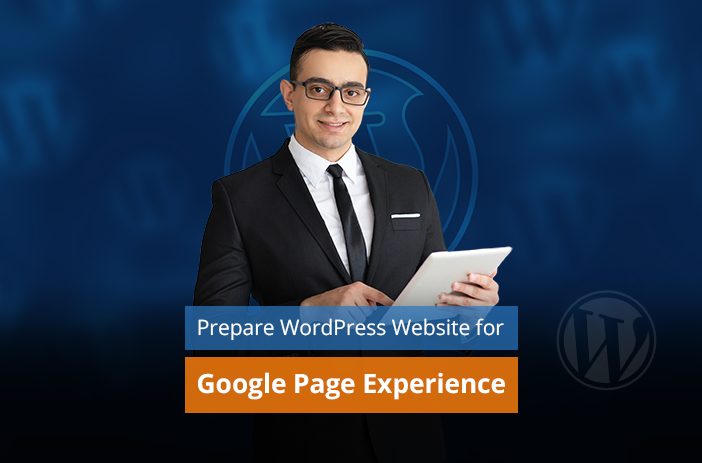Prepare WordPress Website for Google Page Experience

Google has made it official that the Google page experience update will be rolling out from mid-June. For those of you who were unaware of the update, they should know that the latest Google page experience update will directly impact websites that have a bad user experience.
Although the term ‘user experience’ is vague in itself, Google has created a set of metrics that tell about how user experience can be gauged. For most users, these metrics tell a lot about how visitors are perceiving their websites. And, in this article, we are going to tell you just about that.
If you are not looking at user experience when creating landing pages for your website, then perhaps this article will help you just to do that.
With that said, the big question:
Why is Google Page Experience Important?
Google page experience is important for a lot of reasons and we will be listing all of them below.
- Google has now listed core web vitals as a ranking factor
- User experience directly impacts your website conversion rate
- Google experience score is going to stay
- The majority of websites that have a bad Google page experience score are going to get deranked in the coming months
- User experience comprises everything: Speed, user interface, page copy, page pictures/images/videos, and the call to actions
So in essence, the Google page experience is all about making relevant changes to your website so that it can rank higher, faster, and attract more visitors.
All About Google Page Experience 2021 Update
Google Core Web Vitals are a set of metrics that determine user experience. Most digital users are now confused and asking why has Google started focusing on Core Web Vitals when it was only focusing on content and backlinks in the past?
The answer is simple:
Google Focuses on User Intent
In the past, relevancy alone was important because most users had slow internet. However, in the last three years, the world has moved towards 5G which means that users can now get the information they want within seconds. They can watch videos in 4K and they can download content from the internet.
This could only mean that they can also browse websites a lot faster than before. So, websites that still take more than 3 seconds to load are now considered slow.
Also, since everyone can now create relevant links for their websites through guest posting and they can also write long-form content, it only makes sense to focus on user intent.
>>> Never Lose Your Potential Customers. Hire Best WordPress Experts in Perth. Call Us Today
What is User Intent?
Let’s dissect what a user wants when they search for a query on Google or any other search engine:
- To get the most relevant websites
- To get the information they are looking for on the first three listings
- To load them faster and then move to whatever they were previously doing
- To smoothly scroll through each website to the information they want. This can be an ebook download, a contact us page, or ordering a product.
Since relevance criteria were already being met through endorsements aka backlinks from other sites, Google wanted to focus on sites that load faster. Websites that are not relevant and load fast can rank in the first three listings on Google search engine pages.
This is the simple formula for user intent:
User Intent: Relevancy + Performance + Smooth User Journey
Important Metrics of Page Experience Signal
Google has set three metrics for page experience. These are:
FID: First Input Delay (FID) can simply be understood as the first bit that is downloaded by the user browser.
LCP: Largest Contentful Paint is the biggest element on the page that will be downloaded on the client browser. LCP determines the time it takes for that asset to be downloaded.
CLS: Cumulative Layout Shift (CLS) is the variation in the layout of the page due to the emergence of an element after some time of page loading. CLS checks for this turbulence and provides a score.

>>> 2X Your Google Page Speed Score. Hire Top WordPress Experts. Call Us Today
How Each Core Web Vital Metric Can Be Improved?
If your website or the LCP score is more than 3 seconds, on testing with Google Page Insights, Google Lighthouse, or GTMetrix page speed tools, then you need to look at the areas described below.
Change Web Hosting
First and the most important metric for Google page experience is performance improvement. If your website is slow, takes more than 3 seconds to load, then it will lose most of its visitors. You don’t want that to happen, right? So, change your website hosting.
If you are on a shared hosting solution, then move to a cloud or a VPS hosting solution. These are some of the best options for speed improvement. Just make sure to check the hosting stack before you approve of a hosting solution. A few things to check in a hosting solution are:
- The hosting stack
- Server-level cache
- Hosting support
- CDN & SSL should come included
- Speed improvement (get a free trial)
Defer Script Loading
Next, you should move all the scripts that load when the site is run on a client browser to load after DOM Content Load or after Windows page load. You can use Google Tag Manager (GTM) to make sure that your scripts are loaded after the DOM or Windows page. You can also use other scripts to hardcode them inside the pages. However, just make sure that you are either technical or have a developer working for you that can do these things.
Decrease Page Size
Another thing that you should focus on is to decrease the overall page size of your website. If you have a 2MB pagesize, then see what are the reasons for that page size. Can it be decreased? If you have a few images, each of 200KBs, then that page must also be impacting the web pages.
You should simply reduce the overall page size. This will decrease the page size to 1MB or even less.
A few ways to crease the overall page size are:
- Reduce the image size
- Remove fonts available on the site
- Decrease the number of scripts on the site
- Load scripts from files available on the server
- Minimize codes such as HTML, CSS, JS
Add Server Cache
We have already discussed how changing the hosting solution of your website can improve overall performance. So, what you should do is to see the type of server cache available. A few server level caches you can use include Redis, Nginx, Varnish, and MemCache.
Make sure that you have these server-level cache available on your websites so that the site loads faster on client browsers.
Add CDN and SSL
Another thing that can help you improve overall website performance is adding a Content Delivery Network (CDN) to your website. You can start with a free CDN service such as Cloudflare on your website. It will distribute your website content to multiple servers across the globe. It means when someone visits your website, they will be able to get access to the pages faster.
Similarly, make sure to add an SSL certificate to the website. SSL certificate ensures that your website content is encrypted. If your site is encrypted, Google and other search engines will automatically give it more value. Moreover, browsers now show a ‘Not Secure’ tag with websites if they don’t have an SSL certificate available. These steer the visitors away from visiting a website.
Reduce Popups and Interstitials
Finally, make sure that your website has minimum use of popups and interstitials.
Although interstitials and popups don’t directly impact the performance (speed) of a website, they do impact the user experience overall. Here is an example of popups impacting the site performance.
Let’s say a person visits a website. When the person clicks on a button on the site, a popup image shows up. This interrupts the experience of the user and he/she clicks on the exit button. That’s a loss of a potential customer.
You don’t want to do that, right?
Ready to Prepare for WordPress Google Page Experience?
That’s all there is to know about Google page experience. If you want to increase the page experience of your website, then the tips mentioned in this article will help you a lot.
If you are not sure how to optimize your website’s Google page experience, then get in touch with our WordPress experts. They will properly guide you about how to optimize your website for better engagement, conversion rate, and obviously higher order volume.
>>> Get Better Google Page Experience Score With Our Help. Book a Call Today
